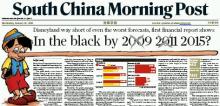 In a faintly amusing attempt to mollify popular outrage over transfers of public resources to private interests via pointless infrastructure projects, the Hong Kong government expresses dismay at the commercial performance of the world’s smallest, and only state-owned, Disneyland. Commerce Secretary Rita Lau’s claim that the Mouse has contributed to the local economy can be dismissed; after you factor in an estimated (in 2005) opportunity cost of some HK$290 billion, the headline loss of HK$4.4 billion is a bit of loose change rolling away from the mountain of net wealth squandered on the theme park. It will never be in the black.
In a faintly amusing attempt to mollify popular outrage over transfers of public resources to private interests via pointless infrastructure projects, the Hong Kong government expresses dismay at the commercial performance of the world’s smallest, and only state-owned, Disneyland. Commerce Secretary Rita Lau’s claim that the Mouse has contributed to the local economy can be dismissed; after you factor in an estimated (in 2005) opportunity cost of some HK$290 billion, the headline loss of HK$4.4 billion is a bit of loose change rolling away from the mountain of net wealth squandered on the theme park. It will never be in the black.
Then we have what economists like to call externalities, and what humans call ‘a pain in the ass for you and me’. By pulling in more and more mainland and other visitors, the tourism industry increases traffic congestion, air pollution, urban crowding and shop rents, thus damaging Hong Kong people’s health, opportunities, finances and sanity. The main beneficiaries of this endless flood of shoppers and gawkers are the interests that own the hotels and the malls – essentially the handful of families that run the property cartel.
The ability of pro-democrats to get their heads around this and articulate it effectively to the population has been developing at roughly the same snail-like rate as representative government in the Big Lychee. But the recent mini-uprising over the HK$66.9 billion high-speed rail boondoggle seems to have helped raise awareness, and this time it just might be dawning on people: this whole infrastructure/tourism/property mega-sector, which we are told is one/two/three of the four/five/six ever-so important and vital pillars/legs/foundations of our vibrant economy, is a scam.
It is a parasite, and after sucking the blood out of us for years it is so engorged that there is little space left here for small and medium companies, innovators, start-ups and entrepreneurs. That leaves us with only two serious economic activities to live on. One is all the fixing and dealing between investors, producers, shippers and consumers of tacky but highly popular junk made in China. This productive service to mankind largely takes place outside our city, so our property tycoons can’t leech much out of it.
The other is financial services. At the tawdry end of the business, our banks undoubtedly play a role in the pyramid scheme known as the property market, and they occasionally sell bad investments to the unwary. But for the most part, they make the city richer and better, allocating capital efficiently, creating the liquidity that oils commerce, helping old ladies cross streets and retrieving kittens stuck up trees. You never hear the industry whining for cheap land, lobbying for huge construction projects, or even begging (much) for favours from Beijing.
We are frequently invited – urged, even – to believe that this keystone of our prosperity is in danger of being usurped by a city 760 miles away that has tight controls on international capital flows, a joke legal system, corrupt officials, a heritage of central planning, high taxes and strange-smelling regulatory and accounting systems. The only things it has to recommend it are pedestrianized streets and really good dumplings.
So it gives all friends of the Big Lychee’s banking industry great delight to note that Hong Kong and Shanghai officials signed an agreement yesterday on dual development and co-operation between the two cities’ financial services sectors. It is the 23rd (or is it the 24th? – it’s hard to keep up) pact to enhance cooperation between the two hubs in the last 12 years. Cooperation is now so enhanced that you can eat off it, see your face in it and warm your hands off its life-affirming and seductive glow.


Really no need to go all the way to Shanghai for those dumplings anymore, now that there are TWO outlets of Din Tai Fung in Hong Kong.
well, the grandpa is watching you, what can you do
Are you saying that you don’t love contributing your tax dollars to utterly moronic “public” projects?! Think about the marginalization! we will be marginalized! oh the shame.
What’s a few billion dollars between friends?